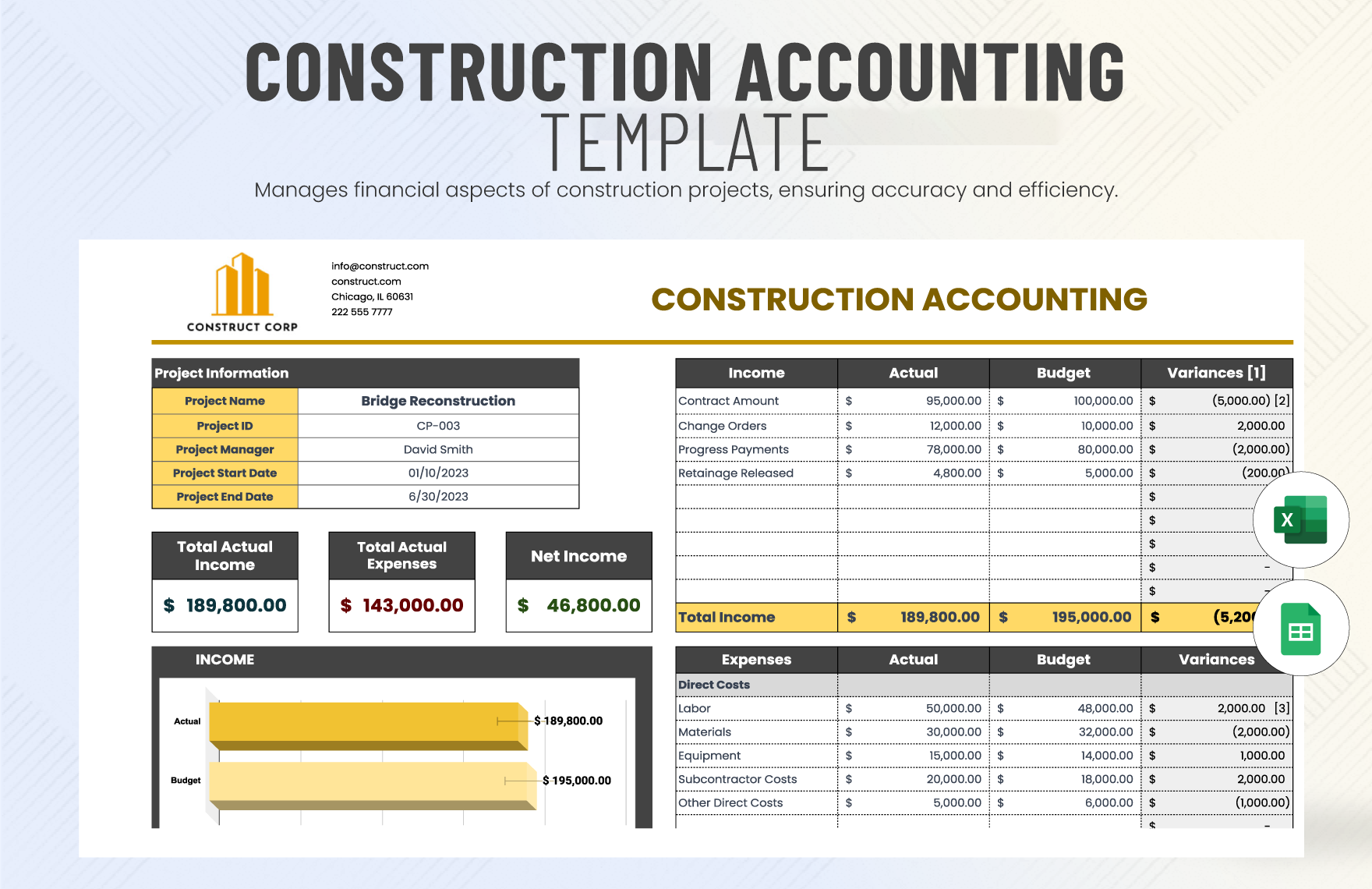Construction Accounting: How to Maintain Accurate Records and Improve Cash Flow
Construction Accounting: How to Maintain Accurate Records and Improve Cash Flow
Blog Article
Recognizing the Importance of Building Accountancy for Successful Project Management

Duty of Building And Construction Audit
Building and construction audit functions as the backbone of financial management in the construction market, ensuring that jobs are completed within budget and economic objectives are met. construction accounting. This specific audit technique addresses the special challenges encountered in construction jobs, consisting of varying task periods, changing costs, and numerous stakeholders
One of the key functions of construction bookkeeping is to offer exact cost estimation and tracking throughout the job lifecycle. This helps with educated decision-making, making it possible for job managers to change timelines and sources effectively. Furthermore, building and construction bookkeeping enhances capital monitoring by keeping track of accounts payable and receivable, therefore making certain that funds are readily available for prompt payments to subcontractors and vendors.
Furthermore, building bookkeeping help in compliance with sector laws and reporting requirements. It equips task managers with the needed economic information to prepare in-depth economic declarations, which are essential for audits and economic evaluations. By preserving clear records, building audit promotes openness and liability, crucial parts in developing depend on amongst stakeholders. Eventually, the duty of building and construction accountancy extends past mere economic monitoring; it is indispensable to strategic planning and operational efficiency, driving the success of building tasks in a competitive landscape.
Key Elements of Construction Accounting

Budgeting establishes a financial structure that guides task implementation, permitting supervisors to assign resources successfully and prepare for prospective financial challenges. Accurate price tracking is necessary for surveillance expenses in real-time, aiding to identify differences in between predicted and real expenses. This makes it possible for prompt adjustments to maintain the job on budget plan.
Additionally, financial coverage gives stakeholders with a clear image of the project's economic health. Regular reports, such as profit and loss statements and capital analyses, promote notified decision-making and improve transparency among all parties involved.
Additionally, conformity with industry laws and accountancy standards is vital. This guarantees that monetary practices are not just effective but also authorized, securing the organization against lawful repercussions. By integrating these key components, construction audit cultivates a structured strategy to taking care of financial resources, ultimately contributing to the effective completion of building and construction projects.
Benefits for Task Supervisors
Leveraging reliable building and construction accounting practices supplies job supervisors with a wide variety of benefits that improve both operational effectiveness and economic oversight. One significant benefit is boosted budget monitoring. Precise monitoring of profits and expenditures enables task supervisors to check economic efficiency in actual time, making sure projects continue to be within budget and facilitating prompt modifications when essential.
Additionally, building audit improves cash money circulation monitoring, enabling project managers to optimize and prepare for monetary needs resource allocation. By understanding money inflows and discharges, they can much better take care of payments to providers, subcontractors, and staff members, thus staying clear of pricey delays.
In addition, robust accounting systems supply detailed reporting capabilities. Job supervisors can generate records that use insights right into job profitability, cost variations, and resource utilization. This data-driven approach fosters informed decision-making, allowing supervisors to determine prospective concerns proactively and carry out rehabilitative measures.
Lastly, adherence to construction audit standards guarantees compliance with lawful and governing requirements, lessening the threat of disagreements or charges. Generally, reliable building accounting furnishes task managers with the tools needed to drive project success, boost stakeholder self-confidence, and advertise lasting organizational development.
Common Challenges in Building Accountancy
Several task supervisors experience considerable difficulties in building bookkeeping that can impede job success. One of the primary challenges is the intricacy of tracking numerous work websites, each with unique budgets, timelines, and resource allotments. This requires meticulous focus to information, which can be frustrating without a robust bookkeeping system in place.
In addition, fluctuating product expenses and labor rates can complicate budget website here plan monitoring, making precise forecasting hard. Project managers commonly have a hard time to reconcile these costs with actual expenses, causing prospective financial discrepancies.
Furthermore, construction audit includes conformity with different policies, consisting of tax obligations and labor legislations. Browsing these guidelines can be difficult, particularly for supervisors who might not have a strong audit background.
An additional significant difficulty is taking care of capital, which is essential in the building and construction sector. Delays in invoicing, settlements from clients, or unanticipated project changes can produce cash flow scarcities, jeopardizing the task's progress.
Last but not least, effective communication in between project supervisors, accounting professionals, and field teams is essential. Misunderstandings can lead to inaccurate economic coverage, further complicating task management initiatives. Attending to these obstacles proactively is vital for effective construction bookkeeping.

Finest Practices for Effective Accounting
While browsing the complexities of building bookkeeping can be complicated, adopting finest methods can considerably improve financial monitoring and task success. One basic technique is preserving precise and prompt records. Executing robust bookkeeping software customized to building and construction projects can simplify information entry, invoicing, and reporting, conserving and lowering mistakes time.
Furthermore, establishing a clear budget and normal surveillance against this budget plan are important. Employing a system of periodic monetary testimonials enables job managers to identify variances early, facilitating prompt decision-making. It is additionally necessary to separate task expenses right into indirect and straight classifications, enabling more clear understandings into profitability.
One more best method entails promoting open communication among all stakeholders. Normal updates and collective conversations about economic condition can make certain everyone is straightened and informed. Educating team in construction-specific accountancy principles further improves expertise and accuracy.
Finally, ensuring conformity with pertinent bookkeeping criteria and regulations is non-negotiable. Routine audits and interior evaluations add to openness and accountability, developing trust with customers and stakeholders. By concentrating on these ideal practices, building companies can optimize their accounting procedures, eventually driving job success and financial security.
Final Thought
Finally, building and construction bookkeeping plays a crucial function in making certain successful job administration by facilitating exact monetary oversight and enhancing decision-making. By incorporating crucial parts such as price estimation, cash flow monitoring, and compliance, job supervisors can browse typical challenges and utilize ideal methods for efficient accountancy. Inevitably, a durable building and construction audit structure not only safeguards spending plan integrity yet additionally adds to the overall economic wellness of construction jobs, promoting lasting success within the industry.
By incorporating these crucial elements, building bookkeeping cultivates a structured method to taking care of financial sources, inevitably contributing to the successful completion of construction tasks.
Accurate tracking of incomes and expenditures permits project managers to monitor financial efficiency in real time, guaranteeing tasks stay within spending plan and assisting in prompt modifications when essential.
Task supervisors can generate reports that provide insights into task success, price differences, and source usage.Lots of job managers run important source into substantial challenges in building audit that can impede job success. construction accounting. Ultimately, a durable building accountancy structure not go to my site just safeguards budget plan stability but additionally adds to the overall financial health of building projects, cultivating sustainable success within the sector
Report this page